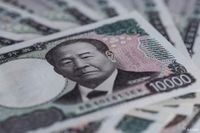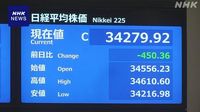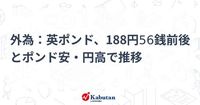On April 21, 2025, the Tokyo stock market experienced a significant downturn as the Nikkei average fell to 34,279.92 yen, a decrease of 450.36 yen from the previous week. This decline was largely attributed to a stronger yen, which rose to levels not seen in about seven months, reaching approximately 140 yen against the dollar. Investors reacted to this shift with increased selling pressure on export-oriented stocks, particularly in the automotive and construction machinery sectors.
The morning session began with the Nikkei average down by 429.93 yen, closing at 34,300.35 yen. At one point, it dropped to 34,297.76 yen, reflecting a 432 yen decrease. The Tokyo Stock Price Index (TOPIX) also fell, ending the morning session down 30.22 points at 2,528.93. Overall, the turnover in the Tokyo Stock Exchange Prime Market was reported at 1 trillion 562.497 billion yen.
Market analysts noted that the recent appreciation of the yen has raised concerns about the profitability of export companies. As the yen strengthened, selling orders for stocks in industries reliant on exports surged. "The rapid appreciation of the yen could negatively impact the earnings of export firms," a market observer commented.
Despite the overall negative sentiment, some sectors showed resilience. For instance, retail companies, which benefit from lower import costs due to the stronger yen, saw a mix of buying activity. Notably, Nitori Holdings (9843.T) and Chugai Pharmaceutical (4519.T) exhibited firm performance amidst the market's turmoil.
In contrast, major players like Fast Retailing (9983.T), Bandai Namco Holdings (7832.T), and Recruit Holdings (6098.T) contributed significantly to the Nikkei's decline. The day's trading concluded with 534 issues (32%) rising, while 1,053 issues (64%) fell, and 49 issues (2%) remained unchanged.
The fluctuations in the currency market were influenced by speculation surrounding an upcoming meeting on April 24 between Japan's Finance Minister Shunichi Kato and U.S. Treasury Secretary Janet Yellen. Analysts suggested that there could be discussions about correcting the weak yen, which has been a point of contention for both nations.
Adding to the complexity of the situation, White House National Economic Council Chairwoman Hasset recently indicated that President Trump is contemplating the dismissal of Federal Reserve Board Chairman Jerome Powell. This news has heightened concerns regarding the independence of the central bank, leading to increased selling of the dollar in the foreign exchange market.
As of the morning of April 21, the dollar was trading at approximately 140 yen, which has raised alarms among investors. "The market is cautious as we navigate these fluctuations. Optimism is not advisable, but we must also be aware of the risks of a reversal in yen buying positions," stated Naoki Fujiwara, a senior fund manager at Shinkin Asset Management.
Looking ahead, the market remains vigilant about the potential implications of the stronger yen on Japan's export-driven economy. The sentiment among investors is mixed, with some expressing hope that the currency's appreciation could stabilize, while others fear it may lead to a more significant downturn in export earnings.
Meanwhile, the broader economic landscape continues to evolve, with various sectors responding differently to the changing currency dynamics. As the situation develops, market participants will be closely monitoring both domestic and international economic indicators that could influence future trading conditions.
In summary, the Tokyo stock market's recent performance reflects the complex interplay between currency fluctuations and investor sentiment. As the yen strengthens and concerns grow about the impact on exports, market dynamics will likely remain volatile in the coming weeks.








